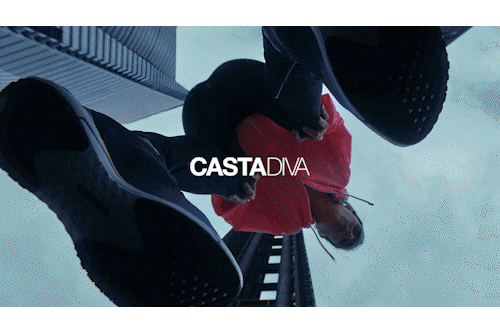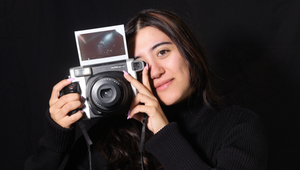
Andrés Aguilar Quesada and the Myth of the Genius

“I wonder if I acquired my passions because I’m an introvert, or became an introvert to indulge in my passions more freely,” says Andrés Aguilar Quesada, associate creative director at UltraSuperNew. When looking back at his shaping years as a child, he recalls indulging in a lot of reading, which he sees as a ‘quiet and lonesome activity,’ that ultimately shaped his tastes and character. Lonely, but not unenjoyable, his childhood was torn between reading and puzzles and playing sports. “Faced with the choice, I decided to be neither (or both).”
As a Latin-American born and raised in Costa Rica, Andrés believes that the Latino identity ‘transcends national boundaries’ and is apparent in the way he sees life ‘as a merry but nostalgic enterprise’, reflected in the way he solves problems and the disproportionate value he gives to resourceful ingenuity. As an early adult, he studied Collective Communication Sciences at the University of Costa Rica, though his ‘real education’ began when he started studying for pleasure. “Writing workshops, art history and cinema courses. I started working in an agency very early, already in my second year of university.”
But contrary to any preconception, his first gig was a bit more unconventional – as a high school graduate he really wanted to buy a new stereo, which led him to take up a job through a friend at ‘a very dodgy company that tasked [him] with writing anonymous kinky copy for a triple X website.’ “I lasted there a month and made enough money to get the stereo. The less you know, the better.”
Andrés’ swift move from that first derail, to the advertising industry, was due to his inability to pursue a career in architecture, which he studied for a semester, but soon found that it wasn’t where his heart lies. “I quickly and wisely decided to change careers. I can only wince at the thought of one of my early architecture models becoming actual buildings.” This realisation brought him to his first agency – Grey Costa Rica, where he spent his early twenties crafting the concept and stories for the toys that come inside the bags of a national brand of crisps. “The creative process involved hours of looking at the plastic contraption and trying to find it in a shape, a resemblance, anything that could give room to creation.”
Later, he admits to having truly honed his craft at BBDO Argentina, where he worked with what he recalls to be ‘the top talent’ of both his generation and the one before. Admittedly still very young and green, Andrés believes that knowing when to ‘shut up and open the notebook’ enabled him to really learn from the big kids. One of those crucial lessons, he shares, was that the myth of the ‘genius’ is a great marketing ploy used to dissuade people from sitting down and really putting in the hard work. “This doesn’t mean there aren’t geniuses out there; I just don’t happen to be one.”
Genius or not, it is a fact that Andrés won a Cannes Lion with one of his projects. However, when looking at his more impactful pieces of work, he looks back at the one project where he ‘first noticed the lines between advertising and entertainment blurring.’ It was an 8-minute short film for an Argentinian credit card company, telling the story of an accountant who is tasked with guaranteeing that every branch of the company has enough candies to give away to their clients. More recently, he points to the work he did for Greenpeace with UltraSuperNew Tokyo: Haters ‘Gon Hate.
When it comes to his favourite part of his job, Andrés struggles to pick one. Like most creatives, he feels that the brainstorming process and the excitement of coming up with new ideas that feel like the right solutions for a certain brief, is one of the most rewarding aspects. However, he also finds peace and solitude in the ‘meticulous process’ of crafting a headline, or even the careful touches for certain paragraphs that get tweaked enough, until they feel just right. All of the fine tuning that goes into his crafting process ultimately gives that sense of collective accomplishment, when one is able to sell an idea to a client.
“The copywriter job requires getting into many different mindsets during a single day,” says Andrés. The same tunings we spoke of earlier are also those that require a different mood and flare – “The headspace you get into when you have to craft a tagline is not the same one you get when you start spitballing ideas, and the same goes for presenting those ideas to a client.” Even though he has to jump gears all the time due to the nature of his job, Andrés still feels that he wants to enjoy himself and contribute to making the people around him have a truly good time.
Undoubtedly, though, the industry raises a lot of questions not only for Andrés himself, but for many creatives. “What is the role of advertising, apart from selling stuff effectively? Is there a more ethical way of doing this? Do we have a part in shaping culture? How topical or political should we go? Can we ruffle someone’s feathers with this, please?” – rhetorical or not, these are important questions that many are still trying to answer through their work, including Andrés.
But at the end of the day, Andrés admits that even though the media space is constantly and drastically changing, the one thing that has stayed and will likely stay the same is that “great stories are still at the heart and soul of every piece of work that resonates and gets people excited.” He astutely turns to an eighth century (kind of modernised) quote by Homer, who even then knew that “We, humans, really dig stories.”
When looking at what could be bettered in the industry, Andrés tells me that “we could become funnier, wittier, write better and script better.” He seems to not be keen on meaning and purpose advertising – ‘It is disingenuous,’ he says. “Why not go back to finding clever, funny and emotional ways of selling products without inflating this transaction into something akin to spiritual illumination? Let’s not take ourselves too seriously, please.” He believes that if creatives truly become all that – funnier, wittier and better writers, the industry can break the narrative that people don’t read anymore or are only willing to watch 3-second-long videos. “People watch a 10-second-long series easily enough, we just have to be better.”
At the end of the day, with all the twists and turns in his career so far and all the lessons learned, when faced with the question of what motivates him and drives him forward, Andrés simply says: “The sense of fulfilment when something that didn’t exist a second ago is now out of your head and scribbled on a piece of paper – that compares to nothing else.”















